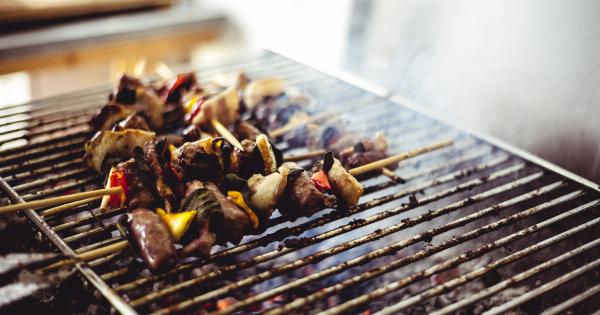Summer is a season most of us look forward to. Warm weather, outdoor activities, and plenty of sunshine make it a perfect time to enjoy life to the fullest.
However, for individuals with gastroesophageal reflux disease (GERD), the summer season can also bring about a unique set of challenges. The rising temperatures, dietary changes, and increased physical activities can exacerbate acid reflux symptoms, leading to discomfort and disruptions in daily life.
Understanding GERD
GERD is a chronic condition in which stomach acid flows back into the esophagus, causing various symptoms such as heartburn, regurgitation, and chest pain.
It occurs when the lower esophageal sphincter (LES) weakens or relaxes inappropriately, allowing stomach acid to escape. While GERD can affect individuals year-round, certain aspects of summer can aggravate the condition and make symptoms more pronounced.
Identifying Summer Triggers
1. Spicy and Acidic Foods:.
The summer season often brings with it a plethora of spicy and acidic foods, such as barbecued meats, citrus fruits, and hot sauces. These foods can directly irritate the esophageal lining, triggering acid reflux symptoms.
Avoiding or minimizing consumption of these food items can help alleviate GERD symptoms during summer.
2. Carbonated and Alcoholic Beverages:.
Carbonated drinks and alcoholic beverages are commonly enjoyed during summer parties and gatherings. Unfortunately, they can relax the LES and contribute to acid reflux symptoms.
Opt for non-carbonated and non-alcoholic beverages like water, herbal tea, or infused water with fruits and herbs to stay hydrated without aggravating GERD.
3. Outdoor Grilling:.
Barbecues and outdoor grilling are popular summer activities, but they can pose challenges to individuals with GERD. Grilled meats and high-fat foods can trigger reflux as they take longer to digest.
Try grilling lean meats, fish, or vegetable options and pair them with lighter sides to minimize symptoms.
4. Long Days and Late Nights:.
The longer days of summer often lead to socializing and staying up late. However, eating close to bedtime can worsen GERD symptoms. Allow at least two to three hours to pass after eating before lying down or going to bed.
Additionally, try having lighter meals in the evening to reduce the risk of nighttime reflux.
5. Physical Activity:.
Engaging in physical activities or sports during the summer can trigger GERD symptoms. Vigorous exercises can increase abdominal pressure and force stomach acid back into the esophagus.
While staying active is important for overall health, try low-impact exercises like swimming or walking to minimize the risk of reflux.
Managing GERD During Summer
Although summer triggers might seem challenging, there are several effective ways to manage GERD and enjoy the season without compromising your well-being. Follow these tips to beat the heat and keep your acid reflux symptoms in check:.
1. Stay Hydrated
Drinking plenty of water is crucial for overall health and can help alleviate GERD symptoms. Hydration helps dilute stomach acid, reducing the risk of heartburn and promoting proper digestion.
Opt for water or non-citrus infused water throughout the day to stay hydrated without triggering reflux.
2. Eat Smaller, Frequent Meals
Instead of consuming large meals, opt for smaller, frequent meals throughout the day. Overeating can put pressure on the LES, leading to acid reflux.
Eating smaller portions at regular intervals helps prevent excessive stomach distension and allows for better digestion, reducing the likelihood of symptoms.
3. Choose GERD-Friendly Foods
When planning meals, focus on foods that are less likely to trigger acid reflux. Opt for lean proteins like chicken, turkey, and fish, and include plenty of fruits and vegetables. Whole grains, nuts, and seeds can also be included in your diet.
Avoid fried and greasy foods, as they can aggravate GERD symptoms.
4. Practice Mindful Eating
Eating mindfully and slowly can aid digestion and reduce the risk of acid reflux. Chew your food thoroughly and avoid distractions such as smartphones or TV while eating.
Mindful eating allows you to tune in to your body’s signals of fullness, preventing overeating and excessive pressure on the LES.
5. Wear Loose-Fitting Clothing
Tight-fitting clothes, especially around the waist and abdomen, can add pressure to the stomach, exacerbating GERD symptoms. Opt for loose-fitting clothing made of breathable fabrics to minimize discomfort and allow for proper digestion.
6. Sleep on an Incline
Raising the head of your bed by 6 to 8 inches can help prevent nighttime reflux. Elevating the upper body reduces the likelihood of stomach acid flowing back into the esophagus during sleep.
Utilize bed risers or place a foam wedge under your mattress to achieve the desired incline.
7. Practice Stress Management
Stress can worsen GERD symptoms, so incorporating stress management techniques into your daily routine is essential. Engage in activities that help you relax, such as yoga, meditation, or deep breathing exercises.
Prioritizing self-care and finding healthy ways to cope with stress can significantly benefit your overall well-being, including managing GERD.
8. Limit Sun Exposure to Prevent Medication Side Effects
Some medications used to manage GERD can increase sensitivity to the sun, making skin more prone to sunburn. Limiting sun exposure during peak hours and wearing sunscreen can help prevent any potential side effects.
Consult with your healthcare provider or pharmacist to understand if any medication you’re taking is photosensitive.
9. Avoid Triggering Beverages
Aside from carbonated and alcoholic beverages, some individuals with GERD may find specific drinks trigger their symptoms. Pay attention to your body’s reactions and identify any personal triggers.
Common culprits include coffee, caffeinated tea, and certain fruit juices. Substitute triggering beverages with GERD-friendly alternatives that soothe your digestive system.
10. Seek Professional Help
If you find that despite your efforts, GERD symptoms persist and significantly impact your quality of life during the summer, it is essential to seek professional help.
A gastroenterologist or healthcare provider can provide accurate diagnosis, recommend lifestyle changes, and prescribe appropriate medication to manage your condition effectively.
By implementing these strategies and making necessary adjustments, you can beat the heat and manage GERD symptoms during the summer season.
Remember to listen to your body, prioritize self-care, and consult with a healthcare professional for personalized advice. With the right approach, you can enjoy all the summer activities without compromise.





























